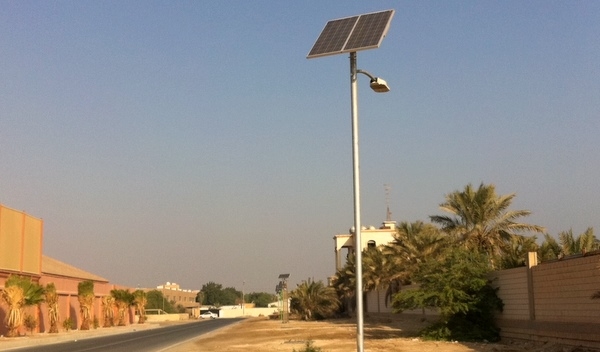Amidst a never-ending struggle of a government that cries for decreasing a mind-boggling consumption of power through awareness campaigns and consumers who cannot let go of their daily dependency on electricity, one man might have found common grounds to address this problem by utilizing what nature has to offer.
The use of renewable energy resources derived from sunlight and wind might have been a familiar sight in Europe and other parts of the world; However, to see windmills and solar energy panels of various shapes and sizes in Kuwait is like watching a scene from a science-fiction movie; that is what one notices when passing by Mohammad Ali Al-Naki's house in Salwa Area.
Al-Naki, an environment enthusiast and a renewable energy advocate, has been pioneering the usage of alternative energy since the mid-1980s. Al-Naki, Chairman of Kuwait Industries Company Holding, believed that there was an ongoing quest to make the most of renewable and clean energy resources.
He is also a member of the European Wind Energy Association (EWEA) and the American Wind Energy Association (AWEA), has set up wind turbines and solar panels to provide power to his home, hence, offering an idiosyncratic experience into the world of alternative energy in the country.
"What you plant now, you harvest later," Al-Naki said in an intimate sit-down with Kuwait News Agency (KUNA) at his home. "It is important to lead by example to educate society on the usage of alternative energy so that future generations would reap the benefits." He highlighted the importance of smart use of electricity and ones responsibility towards power consumption.
His endeavors in utilizing clean energy resources dated back to 1985 when he used solar panels to heat water at his home. Al-Naki described this project as an individual effort and "a personal interest" to dabble with green energy resources.
"One does not simply capitalize on solar energy without coordinating with the authorities and embarking on such steps alone will result in grave consequences such as a blackout in the area," pointed out Al-Naki who indicated that his panels and turbines were not connected to the main power-grid of the area and they were solely used within the parameters of his residence. Al-Naki revealed that his windmills generated around 100-7,000 megawatts of electricity; all depending on the height of the windmill and type of installed blades.
The argument of wind power versus solar energy, when discussed within the context of Kuwait, differed tremendously due to the fact that windmills were more suitable for locations with more wind activity, while solar panels could be placed anywhere provided there was space to encompass the wide panels.
Despite being a hobby, Al-Naki hoped that one day the use of eco-friendly energy resources would spread across the country. He noted that he was a part of a major solar energy system project connected with the Fanar complex in Salmiya, as well as other personal venture to use wind in powering a small shed at his residence.
He stressed that the feasibility of using clean energy requires the right environmental conditions, funding and general social acceptance. He could easily see wind turbines of 100 MW generating power for street lamps on highways and parks. In addition, solar panels could be the perfect solution for desert-goers to replace their noisy and oily power generators at camp sites.
"Knowing the fact that material of solar panels and windmills could be produced locally, should be a great incentive to use green energy," Al-Naki encouraged. The production of devices that were compatible with Kuwait's weather conditions and local regulations, would not only lead to decreasing dependency on orthodox energy resources such as oil and natural gas, but would also alleviate power consumption that reach its highest levels during the summer, he noted.
Al-Naki concluded his intriguing conversation by urging the government to take into consideration the deployment of renewable energy resources that would result in significant energy security and economic benefits.
KUNA
25 August
























































